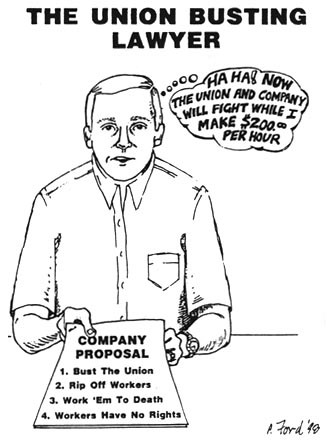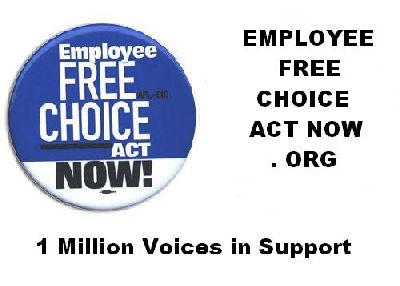Baltimore IMC : http://www.baltimoreimc.org
News :: Labor
Watch out for employers' attorneys writing as guest columnists on the Employee Free Choice Act.
Thursday, January 15, 2009
By Stephanie Kraft
There's no law to keep newspapers from grabbing whatever comes across an editor's desk and cramming it into a column with the discreet disclaimer "Viewpoint."
By Stephanie Kraft
There's no law to keep newspapers from grabbing whatever comes across an editor's desk and cramming it into a column with the discreet disclaimer "Viewpoint."

efcanow.blogspot.com/
www.employeefreechoiceactnow.org
But the paper would be doing its readers more of a service to put a note somewhere, even in fine print, when the "guest columnists" have clients with a vested interest in the issue they are writing about.
A case in point is a purported op-ed about the Employee Free Choice Act published in the Springfield Republican December 28 (a similar piece by the same authors was previously published in at least one other paper, the Boston Herald). Written by lawyers Peter Moser and Sheryl Eisenberg, the article was misleading from the get-go, beginning with the headline "We should say 'no' to bailout for big labor."
"Bailout" is a misnomer for a liberalized union organizing law. Because it streamlines the organizing process, such a law may channel a few dollars to the unions more expeditiously than before. But it hardly opens the floodgates for them to receive billions, as the implied similarity to the financial services bailout suggests.
The piece goes on to say that the law passed by the House and now awaiting further process takes away the right to secret elections. In fact, the law would allow a union to be certified without a secret ballot process in cases when a majority of workers sign cards, but when fewer sign, secret elections would still be held.
One of the new law's notable effects would be to impose fines of $20,000 for abuse of workers during organizing efforts and during the negotiation of the first contract. Now, though employers may be forced to rehire fired workers, there are no meaningful financial or legal penalties for such abuses.
"Taking away the workers' right to secret elections is not in the workers' interest," Eisenberg told the Advocate, adding that the law would in effect do away with secret balloting because unions seldom hold elections except when they know a majority of workers want to unionize, and the law would make secret votes unnecessary when a majority sign cards.
That answer is reasonable as far as it goes, but the article is based an unstated presumption that the only, or chief, danger to workers comes from exploitive unions rather than from exploitive employers unwilling to allow unions.
It's well documented that workers are sometimes intimidated by union organizers, but it's no less well documented that employers often intimidate workers who try to organize. A Cornell University survey found that workers are illegally fired in 25 percent of organizing drives and forced to attend anti-union presentations in 92 percent of unionizing efforts.
And let's not forget that in the larger picture, the 20 years that have seen a steep falloff in union membership have also seen a dramatic decline in worker compensation. Today 91 percent of unionized workers have health care through their jobs as opposed to 70 percent of nonunionized workers.
Ninety percent of unionized workers get retirement benefits through their employers, while only 61 percent of nonunionized employees get them. And unionized workers on average make $2.50 an hour more than their counterparts who are not unionized.
Still—apart from the merits of the law and the questionable stance of the writers who craft their language as if their mission were to protect workers' interests—here's the piece that's missing for the reader. Moser and Eisenberg are identified as "lawyers at the firm Hirsch Roberts Weinstein LLP, a member of the Associated Industries of Massachusetts." Readers aren't told that they are labor lawyers representing employers, the people who stand to lose because of the law.
This is what the firm's website says about Moser:
"Peter Moser represents employers exclusively... defending against unfair labor practice charges, and processing election objections... Peter has represented, counseled, and trained employers dealing with most of the nation's major labor organizations, including the SEIU, Teamsters, SPFPA, UAW, UFCW, UNITE-HERE, Steelworkers, Laborers, AFT, IUE/CWA, and Utility Workers Union.
"With respect to employment litigation, Peter has successfully defended employers against claims of discrimination, wrongful discharge, sexual harassment, retaliation, and wage and hour violations."
Eisenberg, says Hirsch Roberts Weinstein's website, "specializes in all aspects of management-side labor and employment law... Sheryl's practice also focuses on preventive employment practices, including... statutory and regulatory compliance, and advice on the avoidance of discrimination claims... Sheryl also... represents clients at arbitration, defends against unfair labor practice charges at the National Labor Relations Board, and represents employers at all stages of union organizational efforts."
Eisenberg said that "management-side attorneys are not coming out against this bill out of self-interest," and that she saw no conflict of interest in writing the article because "passage of this bill would result in increased work on both sides of the issue"— i.e., for lawyers representing labor as well as management.
But does the article gain Eisenberg and Moser and their firm free advertising and points with their client base?
Do we need to ask?
For More Information on EFCA please visit our website and blog
www.employeefreechoiceactnow.org
efcanow.blogspot.com/
Views
Information
Search
This site made manifest by dadaIMC software


